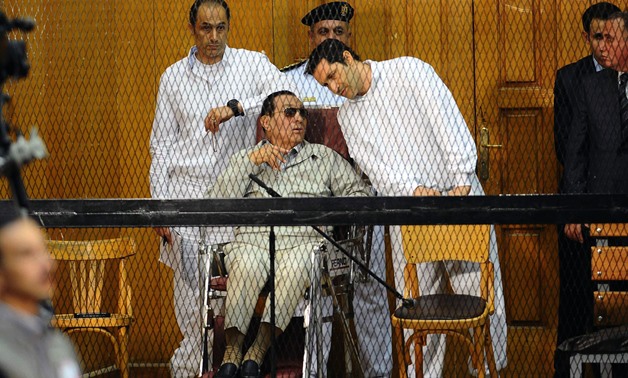
FILE-Egyptian toppled president Hosni Mubarak and his two sons Alaa (R) and Gamal stand behind bars during their trial at the Police Academy on September 14, 2013 in Cairo. AFP PHOTO / AHMED EL-MALKY
CAIRO - 23 September 2018: Egypt’s Court of Cassation rejected on Saturday a request submitted by former President Hosni Mubarak and his two sons (Gamal and Alaa) to suspend a court ruling of three-year imprisonment to reconcile with the government.
The 90-year-old former president and his two sons already served three years in prison over charges of presidential palaces embezzlement and wasting public money worth LE 125 million ($6.9 million). They were also fined LE 125 million and ordered to pay additional LE 21 million.
The Mubaraks’ lawyer Fareed al-Dib filed an appeal to stop the execution of the three-year sentence immediately after the ruling issuance in 2016 in preparation for reconciling with the government. However, the appeal was referred to the Court of Cassation as Mubarak and his sons served time during their remand retroactively, a judicial source told Egypt Today on condition of anonymity as he was not authorized to brief on Saturday.
When the request was referred upon a second request from the lawyer, the Court of Cassation rejected the appeal on Saturday, he added.
The imprisonment sentence means that Mubarak and his sons cannot practice their political rights for six years starting the execution of punishment in accordance with the Political Rights Law. However, if reconciliation were reached, the case would be dropped and their legal personalities would be obtained.
It was reported in 2016 that the Illicit Gain Authority (IGA) restarted auditing the Mubaraks’ assets over accusations of profiteering for over 40 years. In April 2016, media outlets reported that Mubarak and his sons could reconcile with the government via paying an amount of money in return for dropping charges against them.
In October 2015, the Egyptian government passed new amendments to the Reconciliation Law, by which the government would receive smuggled money in exchange for dropping the charges the defendants face.
According to Article 18 of the Illicit Gain Law No 26 of 1975, the legal case of illegal profiteering shall not be dropped in case the defendant died. His/ her heirs shall repay the taken money within five years.
The Mubaraks’ foreign assets were frozen in Swiss banks upon a request from the Egyptian government following his toppling in 2011. Since then, the Swiss authorities conducted investigations with 14 suspects along with Mubarak and froze an estimated 650 million francs ($ 664 million) smuggled out of Egypt during Mubarak’s era to Switzerland. However, in December 2016, Swiss Attorney General Michael Lauber announced in a press conference in Cairo that charges of money laundering and organized crime were dropped against a number of suspects, and a total of 180 million Swiss francs ($175.52 million) were unfrozen and returned to their owners.
The Swiss Attorney General Office (AGO) told Egypt Today in March that Mubarak is not one of the suspects that are being investigated over charges of money laundering or organized crime in Switzerland.
In case you missed it…
CAIRO - 6 September 2017: Swiss authorities have ceased legal mutual aid with Egypt over charges of money laundering or of organized crime in Switzerland during former President Hosni Mubarak's era, Egypt's state-owned news agency MENA confirmed a statement from Switzerland in Cairo on Wednesday.
Seven days ago, Gamal and Alaa Mubarak were arrested as per a Cairo Criminal Court ruling and were sent to Tora prison in preparation for the “exchange market manipulation” case ruling due on November 20. However, they were released on bail of LE100,000 each.
In the second case, Mubarak’s sons, along with Hassan Heikal - son of late prominent journalist Mohamed Hassanein Heikal- Ayman Ahmed Fathi, and Yasser al-Mallawani were charged with illegally obtaining LE493,628,646 by selling a national bank. The trial will be reconsidered by a different jury as per a recent court ruling.
Additional reporting by Ibrahim Kasim

Comments
Leave a Comment